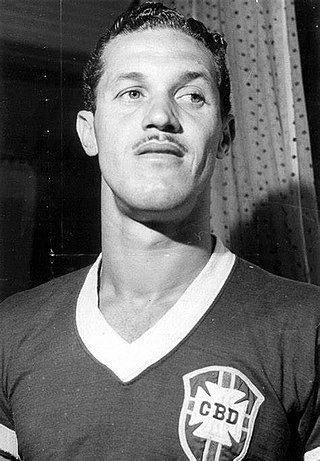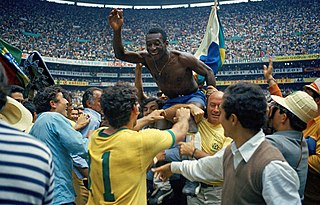
The 1950 FIFA World Cup was the 4th edition of the FIFA World Cup, the quadrennial international football championship for senior men's national teams. It was held in Brazil from 24 June to 16 July 1950. It was the first World Cup tournament in over twelve years, as the 1942 and 1946 World Cups were cancelled due to World War II. Italy, the two-time defending champions, were eliminated in the first round for the first time in history. Uruguay, who had won the inaugural competition in 1930, defeated the host nation, Brazil, in the deciding match of the four-team group of the final round, causing what is sometimes known as one of the biggest upsets in sports history, occasionally called the Maracanaço. This was the only tournament not decided by a one-match final. It was also the inaugural tournament where the trophy was referred to as the Jules Rimet Cup, to mark the 25th anniversary of Jules Rimet's presidency of FIFA.

The Sociedade Esportiva Palmeiras, commonly known as Palmeiras, is a Brazilian professional football club based in the city of São Paulo, in the district of Perdizes. Palmeiras is one of the most popular clubs in South America, with an approximate 21 million supporters and 198,656 affiliated fans. Despite being primarily a football club, Palmeiras competes in a number of different sports. The football team plays in the Campeonato Paulista, the state of São Paulo's premier state league, as well as in the Brasileirão Série A, the top tier of the Brazilian football league system.

Club de Regatas Vasco da Gama, commonly referred to as Vasco da Gama or simply Vasco, is a sports club based in Rio de Janeiro, Brazil. Although originally a rowing club and then a multi-sport club, Vasco is mostly known for its men's football team, which currently competes in the Campeonato Brasileiro Série A, the top tier of the Brazilian football league system, and in the Campeonato Carioca, the state of Rio de Janeiro's premier state league.

Maracanã Stadium, officially named Journalist Mário FilhoStadium, is an association football stadium in Rio de Janeiro, Brazil. The stadium is part of a complex that includes an arena known by the name of Maracanãzinho, which means "The Little Maracanã" in Portuguese. Owned by the Rio de Janeiro state government, the stadium is now managed by the clubs Fluminense and Flamengo. It is located in the Maracanã neighborhood, named after the Rio Maracanã, a now canalized river in Rio de Janeiro.

Leônidas da Silva was a Brazilian professional footballer who played as a forward. He is regarded as one of the most important players of the first half of the 20th century. At the height of his career, Leônidas da Silva was very popular amongst the people of Brazil and Rio de Janeiro. Leônidas played for Brazil national team in the 1934 and 1938 World Cups, and was the top scorer of the latter tournament. He was known as the "Black Diamond" and the "Rubber Man" due to his agility.

Ademir da Guia is a retired professional footballer who played as a midfielder during the 1960s and 1970s for Palmeiras, a leading association football team in Brazil, where he is still regarded as one of the club's all-time best players. Usually a playmaker, he was known for his fantastic close control and passing ability. He was nicknamed O Divino, which means The Divine One, the same nickname given to his father, Domingos da Guia.
Serginho is a diminutive form of the given name Sérgio and may refer to:

Thomaz Soares da Silva, also known as Zizinho, was a Brazilian footballer who played as an attacking midfielder for the Brazil national football team. He came to international prominence at the 1950 World Cup, where he scored two goals. He was lauded as a complete player, with an array of offensive skills such as his dribbling, passing, and shooting ability with both feet, as well as his accuracy from dead ball situations and extraordinary vision. He was Pelé's idol, and is often considered one of the best Brazilian men's footballers of the pre-Pelé era.

Gérson de Oliveira Nunes, generally known as Gérson, is a Brazilian former association footballer who played as a midfielder. He won numerous national trophies with the club sides of Flamengo, Botafogo, São Paulo and Fluminense. He is widely known as "the brain" behind the Brazil Football Team that won the 1970 FIFA World Cup in Mexico.

Ademir Marques de Menezes was a Brazilian footballer, regarded as one of the best forwards in the country's history. His prominent underbite earned him the nickname Queixada. He was also the top goalscorer of the 1950 FIFA World Cup.

Jair da Rosa Pinto, or simply Jair, was an association footballer who played offensive midfielder – one of the leading Brazilian men's footballers of the 1940s and 1950s, who is best remembered for his performance in Brazil's 1950 FIFA World Cup campaign. Usually playing as an inside-forward, Jair da Rosa was noted for his free-role style of play and was most known for his pace and technical ability.

Francisco Aramburu, or Chico was a Brazilian footballer who played as a striker.

Albino Friaça Cardoso, best known as simply Friaça, was a Brazilian football striker.
Zé Maria is a nickname for various people with the given name José Maria, and may refer to these Brazilians:

The Copa Rio was an international club football tournament with teams from Europe and South America, having been held on two occasions, in 1951 and 1952, in Brazil. Both editions were organised and endorsed by the Brazilian Sports Confederation, the then Brazilian FA and sports main body. The tournament is often regarded in Brazil as an official tournament, at least as far as the Brazilian clubs are concerned. The name Copa Rio, Portuguese for Rio Cup, was a homage to Rio de Janeiro City. The 1951 edition of the competition was also hailed as "Club World Cup" or "World Champions Cup" by the Brazilian FA and press. Though some previous club competitions may have been hailed as "the club world contest", Copa Rio was the first attempt at creating a Club World Cup with intercontinental reach.

José Carlos Bauer, commonly known as Bauer, was a Brazilian football player and manager who played as a midfielder.
Olavo Rodrigues Barbosa, best known as Nena, was a Brazilian former football player. He was born in Porto Alegre, Rio Grande do Sul.

This article summarizes the results and overall performance of Brazil at the FIFA World Cup, including the qualification phase and the final phase, officially called the World Cup finals. The qualification phase, which currently takes place over the three years preceding the finals, is used to determine which teams qualify for the finals. The current format of the finals involves 32 teams competing for the title, at venues within the host nation over a period of about a month. The World Cup Final is the most widely viewed sporting event in the world, with an estimated over 1 billion people watching the 2014 tournament final.

Danilo Alvim Faria was a Brazilian footballer. He was a member of the ill-fated Brazilian 1950 World Cup team. One of the greatest center-halves in the World during his prime, he was renowned as a very sophisticated and elegant player who possessed fine ball control and accurate long range passing.

The Expresso da Vitória is known as one of the best association football squads in the history of CR Vasco da Gama and played between 1944 and 1953. The name would have appeared in a musical show of Rádio Nacional, where a singer, when performing, said that he would dedicate the music to Vasco, called by him "Expresso da Vitória", for running over his opponents on the pitch.
















